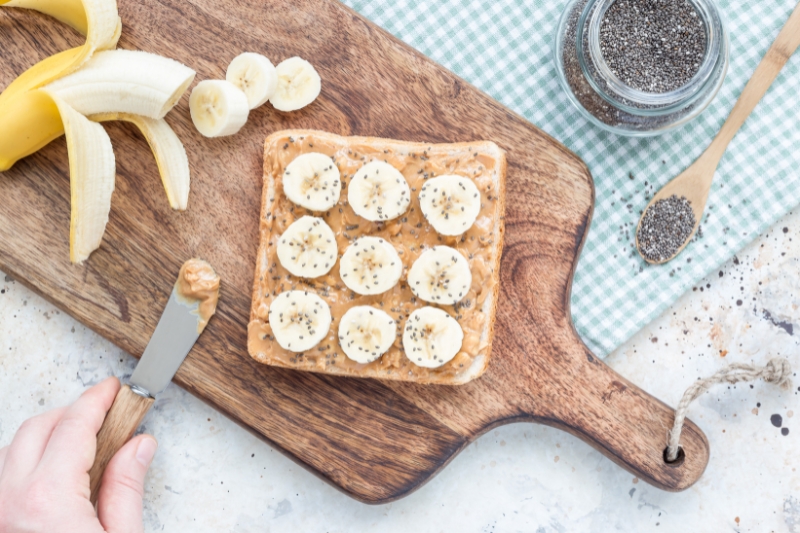Your body’s gut does far more than just digestion and nutrient absorption; the gut houses a significant portion of the immune system and is strongly linked to the mind. The first step to living a healthy life is learning the secret of how to improve gut health naturally.
How Can Gut Health Be Improved With Natural Remedies?
There are 10 steps to improving gut health and maintaining the gut biome:
- Eat foods rich in fiber
- Eat more fermented foods
- Incorporate prebiotic foods into daily meals
- Drink plenty of water each day
- Effectively manage stress
- Avoid all unnecessary antibiotics
- Get high quality sleep consistently
- Get regular exercise
- Eat slowly and chew food thoroughly
- Limit or entirely avoid sugar, processed foods, and alcohol
Bloating, digestive problems, skin disruptions, fatigue, or poor mood can be signs of poor gut health. If you are experiencing any of these symptoms, then this article is for you! It’s impossible to become your best self when your gut isn’t at its best. Read on to learn how to improve gut health and digestion naturally.
The Gut: An Overview
Your gut is more than just your digestive tract. When health practitioners refer to the gut, they are actually referring to the gut microbiome. This is the trillions of microorganisms that live inside a pocket of your large intestine. Although microscopic, this collection of microbes collectively weigh almost as much as your brain.
Your gut microbiome has several important functions that are vital to your body’s functionality:
- Break down dietary elements that your digestive system can’t do by itself
- Produce the enzyme necessary for the body to absorb certain B and K vitamins
- Train your immune system to recognize harmful microbes
- Help your immune system expel pathogens
- Fend off harmful bacterial functions
- Produce short-chain fatty acids that are important for protecting your body from toxins
- Fatty acids also have anti inflammatory properties
- Signal to the brain to produce certain neurotransmitters like serotonin (ie the happy hormone)
- Interact with the cells in your endocrine system – the part of your body that regulates hunger and satiety
Why Does Gut Health Matter for Overall Wellness?

When you think about all the ways your gut interacts with other systems in your body, it gets easier to understand why gut health is such a big deal. You will also begin to see why learning how to improve gut health naturally is the best way to stay healthy and feel great.
For example, one function of the gut is to fend off harmful bacteria, train the immune system, and expel pathogens from the body. If your gut is unwell or not properly balanced, then you may find yourself getting sick more often.
Your gut is also vital in breaking down certain vitamins and macronutrients. This means that no matter how much you’re counting your macros, your body can’t get the benefits from any of it if your gut isn’t aligned.
Similarly, nerves and neurotransmitters link the gut to the brain. Your gut can release hormones or signal your brain to do it. One of these hormones is serotonin, which is the chemical responsible for making you feel happy. If you look back on your week and realize that your mood wasn’t as bright, the culprit may be your gut not your mind.
Other hormones secreted in the gut control appetite and metabolism. Sudden weight gain without a major change in routine can be traced back to an imbalance of these hormones in the gut.
14 Signs That You May Have an Unhealthy Gut
- Frequent illness
- Weight gain
- Cravings for sugar and processed food
- Stomach pain
- Bloating
- Depression, anxiety, or other mood changes
- Difficulty sleeping
- New or worsening allergies
- Repeated infections
- Bad breath
- Feeling tired or foggy
- Feeling hungry more frequently
- Not having an appetite for foods you enjoy
- Changes to your stool
If you are experiencing any of these symptoms, you will be glad to know that there are natural and sustainable solutions. We Care Spa has been at the forefront of holistic gut health for over 35 years. Founder Susana Belen has made it her mission to teach the world how to detox the body, balance the gut, and clear the mind. Your journey to a healthful gut microbiome begins with a stay at We Care Spa in the magical oasis of Desert Hot Springs, California.
Jumpstart your healing today by booking your stay at We Care Spa!
How to Improve Gut Health Naturally: The 10 Foundational Rules
Healing your gut and becoming the healthiest version of yourself will require several lifestyle changes. Gut health all comes down to eating right, moving frequently, and staying away from toxins.
The healers at We Care Spa swear by these 10 rules:
1. Eat Fiber-Rich Foods

Fiber is a type of carbohydrate that comes from plant-based sources. It aids in digestion, regulates your blood sugar, and reduces cholesterol. Daily recommended fiber intake depends on your age. For example, women aged 19 to 50 should consume 25 grams of fiber a day while women over 50 should get 21 grams a day.
The best sources of fiber are:
- Berries
- Avocados
- Whole grains (like oats)
- Legume (like lentils, chickpeas, and kidney beans)
- Quinoa
- Almonds and chia seeds
- Veggies (like brussel sprouts)
- Sweet potatoes
- Dark chocolate.
2. Incorporate Fermented Foods into Your Diet

Fermented foods are a category of food that has interacted with microorganisms. It is similar to the process that occurs in your gut during digestion, which is why fermented foods are a staple in how to improve gut health naturally.
The best fermented foods for gut health are:
- Yogurt
- Sauerkraut
- Kefir
- Kimchi
- Tempeh
- Sourdough
- Apple cider vinegar
- Kombucha.
3. Add Prebiotic Foods to Your Diet

Prebiotics (not to be confused with probiotics) are a type of fiber found in food that your body can’t actually digest. However, they are an excellent food source for the microbes in your gut. In order to maintain a healthy gut ecosystem, you should be consuming 3 to 5 grams of prebiotics a day.
Prebiotics can be found in several common foods:
- Avocados
- Garlic
- Onions
- Bananas
- Asparagus
- Yacon root
- Barley
- Oats
- Artichoke
- Leeks
- Seaweed
4. Drink Enough Water

Staying hydrated can benefit your body in so many different ways: it allows your body to flush out toxins, aids in weight loss, prevents headache and brain fog, keeps your skin healthy, improves movement, boosts brain activity, and supports your digestion.
While there are general recommendations for how much water you need to drink, the actual number is highly individual. Half your body weight in ounces is a great place to start, but you should adjust your water intake up or down depending on how you feel and the color of your urine.
5. Manage Stress Effectively

We Care Spa founder Susana Belen refers to stress as a toxin of the mind. When visitors come to her to be revitalized, she teaches them how to detoxify themselves from stress as well as how to improve gut health naturally. When you make the pilgrimage to We Care near Palm Springs, you will feel your stress melt away as you get massages and wraps, walk the labyrinth, meditate under the pyramid, and lay on the floating bed.
When you join us in the desert, you will also learn how to manage stress with breathwork, sound healing, yoga, fasting, and mindfulness. With these tools, you will be able to leave the spa feeling renewed, rejuvenated, and equipped to properly manage stress.
Get in touch today to book your life-changing wellness vacation!
6. Avoid Unnecessary Antibiotics

In Western medicine, antibiotics are used to treat bacterial infections in the body; antibiotics are prescribed for conditions like strep throat, UTIs, pneumonia, meningitis, skin infections, and more.
While antibiotics can be life saving, they have an unintended side effect: in addition to killing the bad bacteria causing your strep throat, they can also kill the important bacteria in your gut. This can cause your gut to become unbalanced and unhealthy, which can harm your overall well being.
7. Move Your Body Regularly

Exercise benefits multiple organs in your body, from your heart to your lungs and your mind. It also has a big impact on the health of your gut. Exercise plays a role in regulating your metabolism as well as boosting blood flow to your digestive tract. This, in turn, encourages diversity of the good bacteria in your gut, which contributes to an overall healthier microbiome.
Frequent exercise will also aid in reducing stress and set you up for a great night’s sleep! It doesn’t matter how you move your body, as long as it is a type of exercise that you enjoy and that centers you. Whether it’s with yoga, running, rowing, weight training, walking, or cycling, staying active will go a long way towards naturally improving your gut health.
8. Eat Slowly and Chew Your Food Thoroughly

Digestion begins in your mouth: as your teeth chew your food into smaller pieces, your saliva starts breaking down the components of the food. The more food is broken down before it reaches your GI system, the less work your microbiome will have to do to extract the nutrients.
On top of the digestion benefits, eating slowly can also assist in weight loss, remind you to mindfully enjoy your meal, and help you engage fully with your food.
9. Limit Sugar, Processed Food, and Alcohol

Anyone who prioritizes a healthy lifestyle already knows that sugar, processed food, and alcohol are the destroyers of health. This goes double for your gut. When you drink alcohol, even in small amounts, it causes something called dysbiosis. This is the phenomenon in which the natural balance of gut bacteria is disrupted, resulting in fewer good bacteria and more bad bacteria. Sugar and processed food have a similar effect.
No matter where you are on your journey of learning how to naturally improve gut health, the first step is to always cut toxic foods out of your diet.
10. Get Consistent, High-Quality Sleep

The brain-gut-microbiome axis is central to your overall wellness. An unbalanced gut can adversely impact your sleep; it also works the other way around: poor sleep can disrupt your gut microbiome.
When We Care Spa healers teach classes on how to improve gut health naturally, they always say that getting good sleep is one of the easiest things you can do to see big results.
Their top tips for sleep hygiene are:
- Keep your sleep and wake time consistent
- Keep your bedroom dark and cool
- Aim for 7 to 9 hours a night
- No large meals before bed
- Cut back on caffeine
- Get daily exercise
- Don’t do screen time before bed.
We Care Spa is the best place to reset your circadian rhythm. Our beautiful, airy rooms are equipped with blackout blinds, an air purification system, sound machines, aromatherapy diffusers, a circadian light system, and 100% Egyptian cotton bed linens. You are sure to get your best night sleep when you spend a few days at We Care Spa!
Everyday Habits for Optimum Gut Health

It isn’t enough to spend a week detoxing at We Care Spa and then return to all your old habits. As you’ll learn in Susana Belen’s classes on how to improve gut health naturally, holistic wellness comes from habit. Once you make health part of your daily life, you’ll feel so much more energized and ready to take on the world.
It doesn’t have to be hard to incorporate gut care into your normal routine. You may consider waking up to a cup of blood purifier tea; despite the popular belief, tea does not actually dehydrate you, it can count towards your water needs for the day. You could start your day with breathwork like Susana Belen does every morning or exercise while your body is still in a fasted state. Both practices are excellent for easing stress and purifying the lungs.
When it’s time for breakfast, consider a smoothie as an efficient way of getting fiber, fermented foods, and prebiotics into your diet. Just throw some berries (fiber), chia seeds (fiber), yogurt (fermented food), bananas (prebiotic), and avocado (prebiotic) into a blender for a delicious, nutritious meal on the go.
What to Avoid for Better Gut Health
To foster a thriving gut microbiome, it’s essential to not only focus on what you should eat but also what you shouldn’t. Some foods and lifestyle habits can disrupt the balance of good bacteria in your gut, leading to digestive issues, low energy, and overall poor health. Here’s a breakdown of what to avoid for better gut health:
Processed and Ultra-Processed Foods
Processed foods, including fast food, snacks, and ready-made meals, often contain high levels of unhealthy fats, refined grains, and artificial additives. These can lead to gut inflammation and encourage the growth of harmful bacteria. Furthermore, many processed foods lack the nutrients needed to support a healthy gut, leaving your digestive system strained and unbalanced.
Excess Added Sugars and Artificial Sweeteners
Eating too much sugar, especially refined sugar, can disrupt the balance of gut bacteria. High sugar intake has been linked to the growth of harmful microbes that can lead to gut dysbiosis, a state in which the good bacteria are outnumbered by the bad. Likewise, artificial sweeteners like aspartame and sucralose can also disrupt gut bacteria and contribute to digestive issues.
Frequent Alcohol Intake
While an occasional glass of wine or beer can be part of a healthy lifestyle, regular or excessive alcohol consumption can harm your gut. Alcohol can disrupt the gut lining, increase intestinal permeability (leaky gut), and alter the balance of bacteria in your digestive system. It can also lead to inflammation, which can further damage your gut health and immune system.
Overuse of Antibiotics Without Medical Necessity
Antibiotics are powerful medicines used to fight bacterial infections, but they can also kill off the beneficial bacteria in your gut. Overusing antibiotics or taking them when they aren’t necessary (such as for viral infections) can lead to an imbalanced microbiome, weakened immunity, and digestive problems. This is why it’s crucial to only use antibiotics when prescribed by a healthcare professional.
Sample Gut-Healthy Day (Real-Life Application)
Incorporating gut-friendly foods into your daily routine doesn’t have to be complicated or boring. Here’s a sample day that’s designed to fuel your gut, boost digestion, and keep your microbiome thriving. Whether you’re just getting started or looking to refine your gut-health routine, these meals and snacks are a perfect balance of fiber, probiotics, prebiotics, and healthy fats.
Breakfast: Oats with Kefir, Berries, and Chia Seeds

Start your day with a gut-loving breakfast that combines fiber-rich oats, probiotic-packed kefir, and antioxidant-rich berries. The oats provide soluble fiber to support digestion, while kefir helps introduce healthy bacteria to your gut. The chia seeds add omega-3s and fiber, making this meal a powerhouse of nutrients for your microbiome.
Why it’s good for your gut:
- Oats: Help with digestion and regulate blood sugar.
- Kefir: Introduces beneficial probiotics to replenish gut bacteria.
- Berries: Packed with antioxidants to reduce inflammation and support gut health.
- Chia Seeds: Provide healthy fats and fiber, promoting smooth digestion.
Lunch: Lentil Salad with Leafy Greens and Olive Oil Dressing

For lunch, enjoy a fiber-filled lentil salad with a variety of leafy greens and a light olive oil dressing. Lentils are rich in prebiotics, which feed the healthy bacteria in your gut, while greens like spinach or kale are loaded with essential vitamins and minerals that support overall gut health. A drizzle of olive oil offers heart-healthy fats that also contribute to a balanced microbiome.
Why it’s good for your gut:
- Lentils: High in fiber and protein, they help support digestive health.
- Leafy Greens: Rich in antioxidants and gut-friendly nutrients.
- Olive Oil: Supports a healthy gut lining and provides anti-inflammatory benefits.
Snack: Banana with Almond Butter

For a quick, easy, and satisfying snack, pair a banana with a spoonful of almond butter. Bananas are a great source of prebiotics, particularly resistant starch, which feeds beneficial gut bacteria. The almond butter adds protein and healthy fats, which will keep you feeling satisfied between meals.
Why it’s good for your gut:
- Bananas: Provide prebiotics that nourish gut-friendly bacteria.
- Almond Butter: Rich in healthy fats and protein, promoting digestion and satiety.
Dinner: Grilled Salmon, Quinoa, and Roasted Garlic Broccoli

For dinner, enjoy a balanced plate of grilled salmon, nutrient-packed quinoa, and roasted garlic broccoli. Salmon is an excellent source of omega-3 fatty acids, which have anti-inflammatory properties that benefit your gut. Quinoa is a gluten-free whole grain that offers both fiber and protein. Garlic, when roasted, has prebiotic qualities that help promote the growth of beneficial gut bacteria.
Why it’s good for your gut:
- Salmon: Rich in omega-3s, which help reduce gut inflammation.
- Quinoa: A fiber-rich, gluten-free grain that supports digestive health.
- Garlic: Contains prebiotics that nourish beneficial gut bacteria.
Optional: Glass of Kombucha, Chamomile Tea Before Bed
To wrap up your day, unwind with a soothing glass of kombucha or chamomile tea. Kombucha is a fermented tea that provides beneficial probiotics to further support gut health. Chamomile tea is known for its calming properties and can help reduce stress, which is key to maintaining a healthy gut.
Why it’s good for your gut:
- Kombucha: Offers probiotics to maintain a healthy gut microbiome.
- Chamomile Tea: Supports relaxation and may reduce inflammation in the gut.
By incorporating these gut-healthy meals and snacks, you’ll be supporting your digestive system, enhancing your gut microbiome, and feeling energized throughout the day. Plus, it’s a delicious and balanced approach to eating that promotes long-term wellness.
FAQs
The time it takes to improve gut health varies from person to person, depending on the severity of imbalances and the steps taken to support the gut. With consistent, holistic practices like proper diet, stress management, and exercise, many people notice improvements in as little as a few weeks. However, full restoration of gut health can take several months, especially if you’re addressing deeper digestive issues. Patience is key to allowing your gut microbiome to heal and flourish.
Probiotic supplements can be helpful, especially for those with digestive issues like irritable bowel syndrome (IBS), diarrhea, or after a course of antibiotics. However, it’s important to prioritize probiotic-rich foods (such as yogurt, kefir, and sauerkraut) as your primary source of beneficial bacteria. Supplements may be beneficial for specific health concerns, but it’s always a good idea to consult with your healthcare provider before adding them to your routine to ensure they’re necessary for your needs.
Probiotics are live beneficial bacteria that help maintain a healthy gut microbiome, while prebiotics are non-digestible fibers that serve as food for these good bacteria. In simple terms, probiotics populate your gut with beneficial microbes, while prebiotics feed those microbes, helping them thrive. Both are essential for gut health, and a balance of both in your diet is the most effective approach for maintaining digestive wellness.
Yes! Kids can absolutely benefit from gut health practices. A healthy gut is essential for children’s growth, immune health, and emotional well-being. While young children’s digestive systems may not require as many probiotic foods as adults, introducing fiber-rich foods, fermented foods, and a well-balanced diet can support healthy development and a strong immune system. Always consult a pediatrician before making significant dietary changes for your child, especially when introducing probiotic supplements.
Bloating can be a sign of poor gut health, but it doesn’t always mean there’s something seriously wrong. It can result from various causes, including an imbalance in gut bacteria, food sensitivities, or issues with digestion. If bloating is frequent, painful, or accompanied by other symptoms like diarrhea or constipation, it may indicate an underlying digestive issue that requires attention. A balanced diet, proper hydration, and stress management can help alleviate bloating, but if symptoms persist, it’s best to consult with a healthcare provider.
The quickest way to heal your gut is to focus on reducing inflammation, nourishing beneficial bacteria, and eliminating factors that disrupt gut health. Start by removing processed foods, excess sugar, and alcohol from your diet. Incorporate fiber-rich, prebiotic and probiotic foods to support a healthy microbiome. Additionally, managing stress, getting adequate sleep, and staying physically active can all accelerate the healing process. For personalized guidance, consider seeking support from a holistic health practitioner or visiting a wellness retreat like We Care Spa.
Signs of an unhealthy gut can include:
– Frequent bloating, gas, or indigestion
– Unexplained fatigue
– Skin issues like acne, eczema, or rosacea
– Mood swings, anxiety, or depression
– Food intolerances or sensitivities
– Poor sleep quality
– Weight fluctuations
– Persistent bad breath If you’re experiencing several of these symptoms, it may be time to focus on improving your gut health with the tips provided in this guide.
Detoxing your gut involves eliminating toxins, reducing inflammation, and restoring a healthy balance of bacteria. A gut-friendly detox begins with eliminating processed foods, sugar, and alcohol from your diet. Eating fiber-rich, prebiotic, and probiotic foods, staying hydrated, and managing stress are all essential components of a gut cleanse. In addition, practices like intermittent fasting or gentle detox programs (under professional guidance) can support the process. Be sure to give your gut the time it needs to restore its balance naturally.
Do you have more questions?
If you have more questions about improving your gut health or want personalized advice, don’t hesitate to reach out! We’re here to help you achieve your best health. If you’re ready to begin your journey, book a stay at We Care Spa for a holistic approach to gut health and overall wellness.
Come to Our Oasis of Health Near Palm Springs!
Visitors come to We Care Spa to gain the knowledge of how to improve gut health naturally or to begin their own healing journey. Once guests start on their path, they often return to this little desert oasis once or twice a year to re-rejuvenate and continue their learning. Whether you’re new to gut health maintenance or a life-long practitioner, We Care Spa has all the amenities and classes you need to become your healthiest self. Book your stay today or get in touch with any questions you may have!


